Our top picks
Best overall: Simba Hybrid Firm Pillow

There is no doubt Simba Hybrid pillow is a fantastic product, but it is soft to medium. That's why Simba launched the Simba Hybrid Firm pillow, which is medium-firm to firm. Firmness is not the only difference, since these two pillows have a completely different construction. Inside the pillow there are two Simba Renew layers, which are soft layers made of recycled PET plastic bottles. This is why we have given it our Best Firm Pillow 2024 award.
There is also one layer of small Aerocoil springs that are very firm. You can change the arrangement of layers and get a medium, medium-firm and firm pillow. Cover has two sides. One is 100% cotton for those who like a natural feel, and the other side is cotton with Stratos technology, so you always have a cool side of the pillow. Breathable mesh border and the entire construction including springs which act as a fan make it cooling even during the summer.
Advantages



Disadvantages

Best eco-friendly: Panda Memory Foam Bamboo Pillow

The Panda Memory Foam Bamboo Pillow has a lower loft and offers a firm supportive place to rest your head at night. It’s an all-foam pillow that sinks it just enough to support your head but is quick to return to its original shape every time you move position. This pillow isn’t going to lose its shape or density any time soon so it’s a reliable choice of firm pillow. This is reinforced with the 10-year guarantee that comes with it so you know you’ll have it for years to come.
The pillow has a bamboo cover which is soft to the touch and gentle on your skin. Whilst being naturally breathable and cooling for those who get hot during the night.
Check out our full Panda Memory Foam Bamboo Pillow review.
Advantages



Disadvantages


Best value: Emma Original Pillow
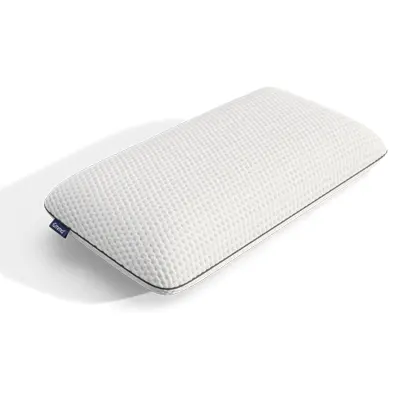
Three foam layers are the heart and soul of this pillow. Each of the layers can be removed, so you can sleep on one, two or all three. There are other similar concept pillows on the market, but what sets Emma Original pillow apart are three different layers. Three types of memory foam are in charge of pressure relieving, support and breathability.
The polyester cover is supposedly moisture-resistant and breathable. In comparison with other polyester covers, that is true, but it certainly cannot be compared to bamboo or cotton. You can 30 nights to test it and make sure it is the right one for you. Two year warranty is expected from premium company such as Emma Sleep.
Advantages



Disadvantages

Best design: Groove Original Pillow
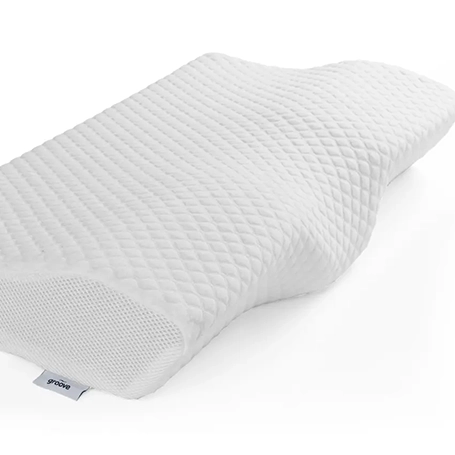
This pillow has been carefully designed and shaped to give you comfort and support throughout the night. Not only that, it’s a firm pillow for those who prefer that feeling. This one is best for front and side sleepers as it corrects your sleep posture to ensure your spine is kept aligned. It has the ‘groove’ in it to rest your head and neck, with a slight overhang for your shoulders to rest comfortably. A firmer pillow is good for those who usually wake up with pain or tension in the neck. The Groove Pillow will help to reduce tension headaches, relieve stiff neck and alleviate back pain too. Sometimes a firmer pillow can be a little uncomfortable but this one has got the balance right so you have a good nights sleep.
Take a look at our Groove Original Pillow review.
Advantages



Disadvantages


Who should use firm pillows?
In general, there are no one-size-fits-all products in the sleep industry. Adjustable pillows have changed that claim to some extent, but there are still too many influencing factors – one feature can’t be equally good for everyone. This includes firmness. While a firm pillow will be great for some, it can cause neck pain, back pain and even insomnia for others. So let's first find out who should use firm pillows and who should stick with softer ones.
Side sleepers
Three-quarters of people are side sleepers, which makes this position by far the most common. Many side sleepers will not agree that a firm pillow is comfortable for them. This is where we come back to personal preferences when it comes to pillow characteristics. But we have to analyze the situation generally.

And why do side sleepers benefit the most from firm pillows? Because there is a big gap between the head and the neck. If that space is not supported by a pillow, the spine will not be aligned, causing numerous problems both short-term and long-term. However, a pillow for side sleepers should not be firm as a rock either. Medium to firm is the ideal firmness, in order to support the head and neck, but at the same time allow a slight sinkage for sake of the comfort. The firmness of the mattress also affects the position of the body, and thus the choice of pillow firmness.
Heavy sleepers
Unlike side sleepers who sometimes like a softer pillow, heavy sleepers in 99% of cases need a firm pillow. Sleepers who weigh more than 90 kg significantly compress the pillow, making it too flat if it is not firm enough.
When you flatten the pillow too much, then the position of the head, neck and spine is irregular, and we know that we have to avoid that if we want to wake up rested and pain-free. The higher the body mass index is, the firmer pillow is needed. The same is true in reverse. Lightweight sleepers should go with soft to medium pillows and lower lofts because they do not compress the pillow almost at all.
Stomach sleepers
The height of the pillow is more important than firmness for front sleepers. Stomach sleeping is placing the neck under a significant amount of strain. That's why this is considered the least healthy sleep position, but many people can't fall asleep otherwise or combination sleepers always end up on their stomach during the night.
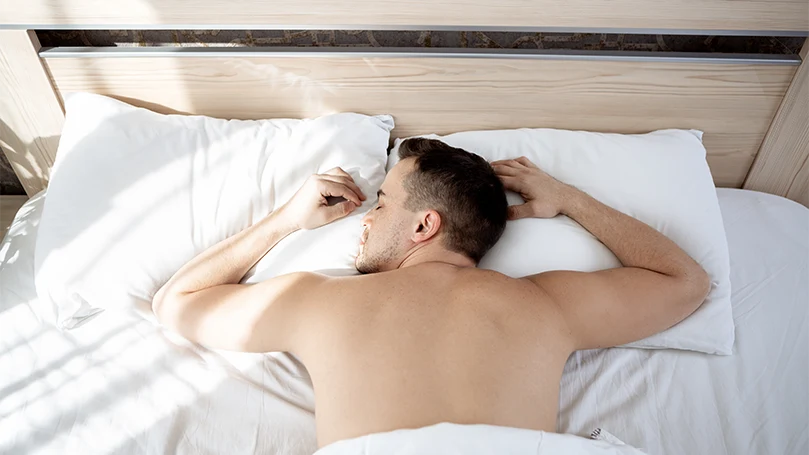
Since the head is close to the mattress when you lie on your stomach, the pillow should not be thicker than 10 cm, especially if it is firm. For example, a firm pillow around 7 cm thick is an excellent choice. If the loft is higher than 10 cm, then a firm pillow is not a good choice, but a softer one is needed so that the head sinks and the neck is in a more natural position.
Back sleepers
Back sleepers can choose most pillows that are somewhere between 4 and 8 on the firmness scale from 1 to 10. The head and neck should not curve backwards too much, so every pillow that will provide enough support either because of firmness or loft is suitable. Nevertheless, a firmer one is better than a very soft one for back sleeping or else the head is going to fall below the level of the spine.

Popular types of firm pillows
We have already mentioned at the beginning how rich the offer of pillows is in the UK sleep market. Dozens, maybe even hundreds of companies manufacture the most diverse possible models. There are traditional ones made from natural materials, memory foam ones, hybrid ones and the list goes on and on. The following are the most popular types of firm pillows.
Polyfoam
This is a type of synthetic foam that is mostly found in shredded form in pillows. However shredded filling is not ideal for those who are looking for a firm pillow, so if you want a firm polyfoam pillow try to find one with a solid polyfoam core. Polyfoam features vary significantly, and the main advantage over memory foam pillows is the price but the density is lower.
Memory foam
Memory foam has been hands down the most popular material in the sleep industry for the past 20 to 30 years. Although it is not high on the sustainability scale, just like other synthetic materials, it has so many benefits and that is why it has taken precedence.
Memory foam pillows can be both very soft and very firm, and that depends on the density. High-density foam is firm and if you want to buy a firm pillow it is a good choice. Of course, such memory foam is not pressure relieving like lower-density memory foam, but it is possible to strike a balance between support, firmness and pressure relief. Hot sleepers are not huge fans of memory foam pillows because of heat retention.
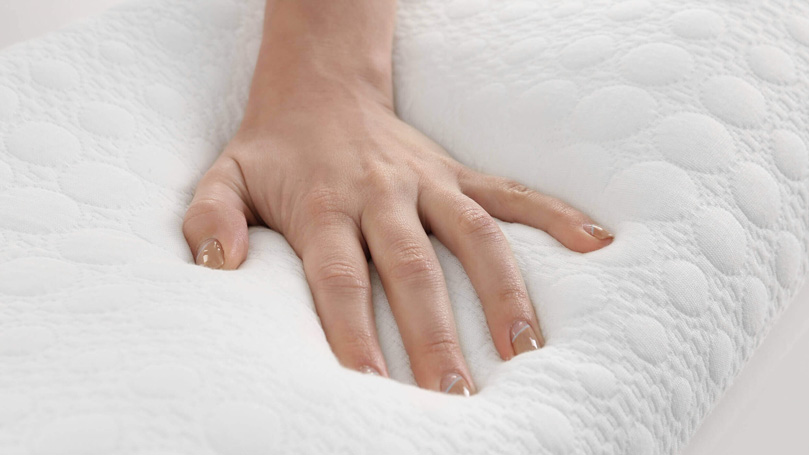
Down
Down is an animal product obtained from the underside of feathers, usually goose or duck feathers. As such, it is not vegan-friendly, but it is sustainable and eco-friendly. Down is also so soft and comfortable, and it is one of the best temperature-regulating materials. It is very expensive.
Since a 100% down pillow would be too soft and expensive, feathers are usually added to make it firmer. Even with the addition of feathers, there is a possibility that down pillows will not be firm enough for some types of sleepers.
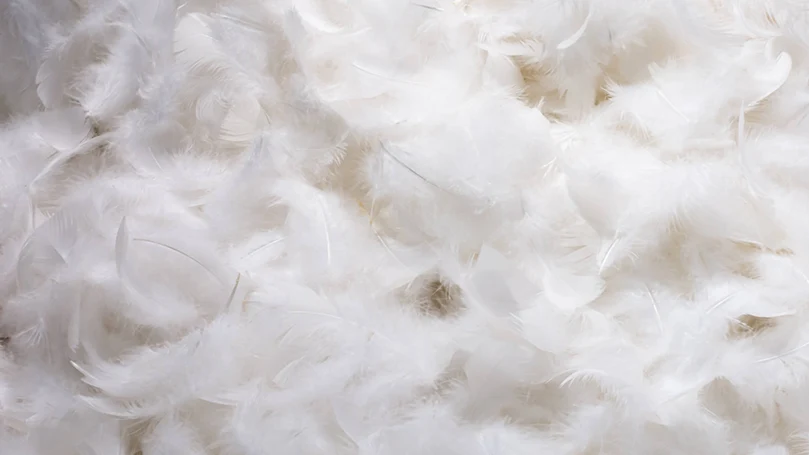
Down alternative
Although they have similar names, down and down alternatives are actually very different. Softness is one of the few characteristics they share. Down alternative is a synthetic material that was created with the aim of providing customers with a cheap, vegan-friendly alternative to down.
The first feeling you will have when you lie down on the down and down alternative is relatively similar, but later the differences become apparent, primarily temperature regulation and breathability. Also, the down alternative is not sustainable. We believe that most of those who are in the market for firmer pillows will bypass down alternatives.
Feather
Feather is firmer and less fluffy compared to down, which is why it is a better choice in this case. Stomach sleepers often find feather pillows comfortable because of the lower loft and firmer feeling. The durability of feather pillows is great and they are cheaper than down, but more expensive than down alternatives. Feather is not for vegans too. True feather allergy is very rare, and the reaction is usually a consequence of mite allergens present in feathers or feathers physically irritating the skin so it is suitable for most allergy sufferers.

Wool
There is no doubt that wool is a fantastic natural material. No material is better in temperature regulation, it is sustainable, and it is also vegan-friendly unlike down, because sheep shearing is necessary for the animal to live.
Nevertheless, wool pillows are not common. You can certainly find them on the market, but they are often pillows filled with wool plus some other material. Also, firmness is soft to medium, which is not what we are currently looking for at the moment. Go with wool duvet for example, but look for a firm pillow elsewhere. Buckwheat is a great firm natural alternative.
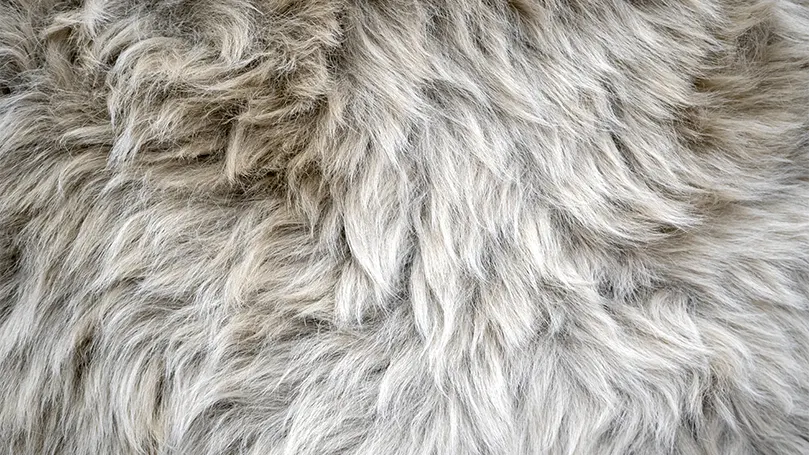
Latex
Latex can be natural or synthetic. Natural is obtained from rubber tree sap and is eco-friendly. Both natural and synthetic are similar in feel to foam. Same as with memory foam, latex density determines firmness. Synthetic latex is duller and less durable than natural, but also cheaper. There is also a blend of natural and synthetic latex.
Natural latex has a quicker response than memory foam, and it is also much more cooling. Since heat retention is one of the main disadvantages of memory foam, latex is dominant in that category. It is 100% hypoallergenic.

What to consider when buying the best firm pillows
Before moving on to the best firm pillows of our choice, we want to first talk about things to consider when buying the best firm pillows. Most of these things are relevant to all types of pillows, so you can apply the advice when buying a softer pillow as well.
Height of pillow
Pillows are divided into three categories – low loft, mid-loft and high loft. There is no rule written in stone, but a low loft is considered thinner than 8 cm, a mid loft from 8 to 14 cm, and thicker than 14 cm is considered a high loft.
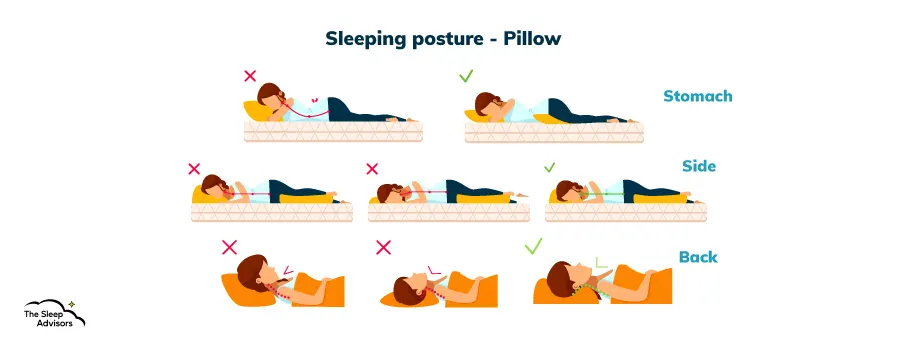
You choose loft according to the sleep position, but also weight. As we have already mentioned, heavy sleepers significantly compress the pillow and therefore need a higher loft. Sometimes the loft is measured as the height when the head is on the pillow, but the manufacturer can't indicate the loft like that because everyone compresses the pillow to a different extent.
Level of support
Support is a feature that tells us how much a pillow can stand the weight of your head without flattening. We believe that you all know very well what pillow support is and how it affects your night's sleep, even without us explaining it to you.
Although a firm pillow must also be supportive, firmness and support are not synonymous. Pillow can be soft to medium, and yet supportive. Exactly how supportive it will be depends on the material and construction of the core.
Pressure relief
Pressure points are under so much tension during the day because we sit a lot and don't have enough physical activity and stretching. The situation worsens during the night if the mattress and pillow are not pressure relieving.
Memory foam and latex pillows are the best for pressure relief. At the same time, they can provide you with firm support and pressure relief due to the characteristics of the material. Therefore, if you feel tension in the pressure points, and especially if you are a side sleeper, do not forget this very important feature.
Moldability
Moldability of a pillow is good if you can easily manipulate the shape of it. It is usually combination sleepers who are looking for a moldable pillow. You cannot expect a firm pillow to be as moldable as a soft one, but not all firm pillows are the same.
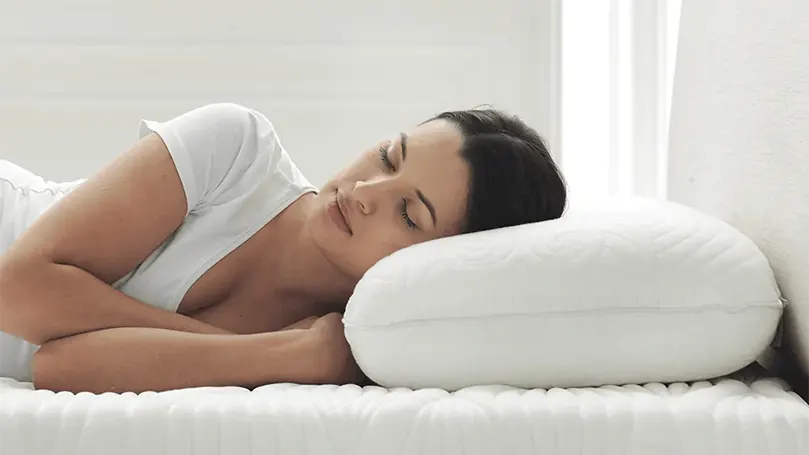
You can mould down, feather and similar pillows even if they are firmer. On the other hand, pillows whose core consists of a single block of memory foam or latex have moldability close to zero.
Thermoregulation
Temperature regulation is often mistaken for breathability. While breathability certainly plays an important part in temperature regulation, it is not the only one. Pillows with good temperature regulation will disperse body heat and help you have a cool night's sleep.
Sleep manufacturers try in different ways to make certain materials cool and thus attract hot sleepers. Since firmer pillows are usually dense, this is not good for temperature regulation. Memory foam has a problem with heat retention anyway, and high-density memory foam is even worse. That's why hot sleepers should choose latex or another type of firm pillow that is not memory foam. Gel memory foam is better in terms of temperature regulation but is usually softer.
Hypoallergenic
Allergies are one of the most common health problems in the world. In the UK alone there are more than 20 million allergy sufferers. They can develop at any age, and symptoms vary from very mild to severe.
For all people alike, whether they have allergies or not, it is important to choose hypoallergenic sleep products. Exposure to allergens for 8 hours every day will almost certainly have a negative effect on the immune system and lead to the appearance of allergies. All synthetic materials are hypoallergenic, and if treated in the right way, most natural materials are also safe but you should double-check with the manufacturer and your doctor.
Tips for buying and using firm pillows
You rest your head on a pillow for about 8 hours every day. That is why it is of the utmost importance to choose the right model. If you have decided that you want a firm pillow, you probably know that such a pillow suits you. Since you have decided on firmness, it is time to analyze other features.
Start with the material because you will be able to conclude more about hypoallergenic properties, breathability and temperature regulation, as well as sustainability. Then check loft, sustain, support and pressure relief. If you often change the sleep position, don't forget moldability.
- Don't just choose a pillow based on firmness, pay attention to loft, support, pressure relief and other features as well
- The pillow must be 100% hypoallergenic, otherwise, you risk developing an allergy or worsening symptoms
- Maintain the pillow according to the manufacturer's instructions to make it last as long as possible.
The advantages of owning the best firm pillows
Some of the advantages of owning the best firm pillows are the same as for any other pillow. We cannot start this part without saying that the main advantage is a good night's sleep. When you wake up in the morning rested and full of energy for the upcoming day, you will understand how important the pillow is.
If we are going to go more specific about the advantages of firm pillows, then we have to start with support. The support that your neck and head will receive has an impact on the whole body. For example, if side sleepers do not have good support between the neck and the head, where is the empty space, that will lead to back pain, and later to problems with the lower body too.
- A firm pillow will keep your head and neck in a healthy position, thus making spine alignment possible
- Most firm pillows feature high-density cores, which implies that their service life will be longer compared to softer, low-density ones
- You will no longer wake up with numb arms and hands because you won’t have to put them under the pillow since you can count on firm support throughout the night.
Spread the word
FAQs about your firm pillows
Let's finish this guide with answers to some of the frequently asked questions about best firm pillows.
In general, side and front sleepers may benefit from firm pillows, but it can be good choice for some back sleepers too. So many other factors are most important than just sleeping position.
Loft is another word for a height of the pillow.
Sizes vary from manufacturer to manufacturer. Sometimes only one size is available and sometimes there are many sizes.


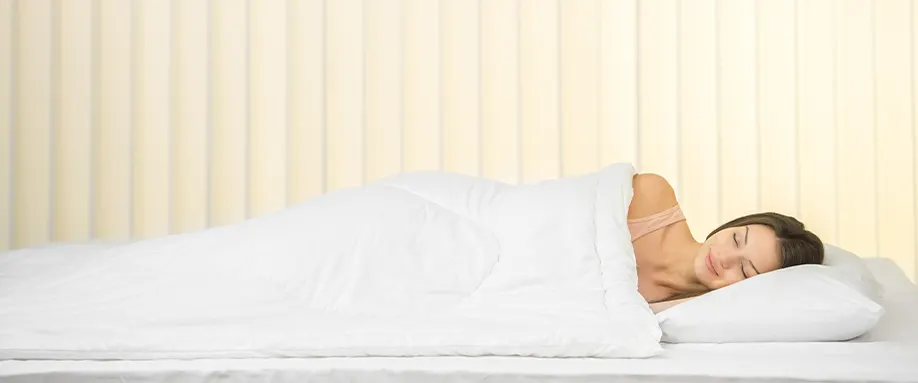

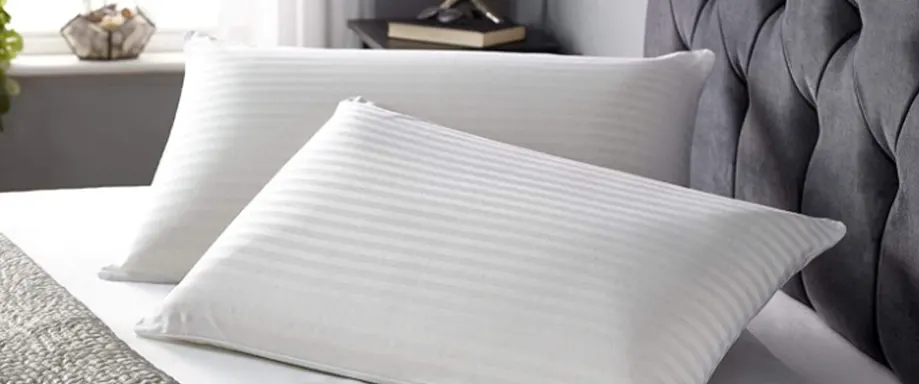












There are no comments yet
"*" indicates required fields